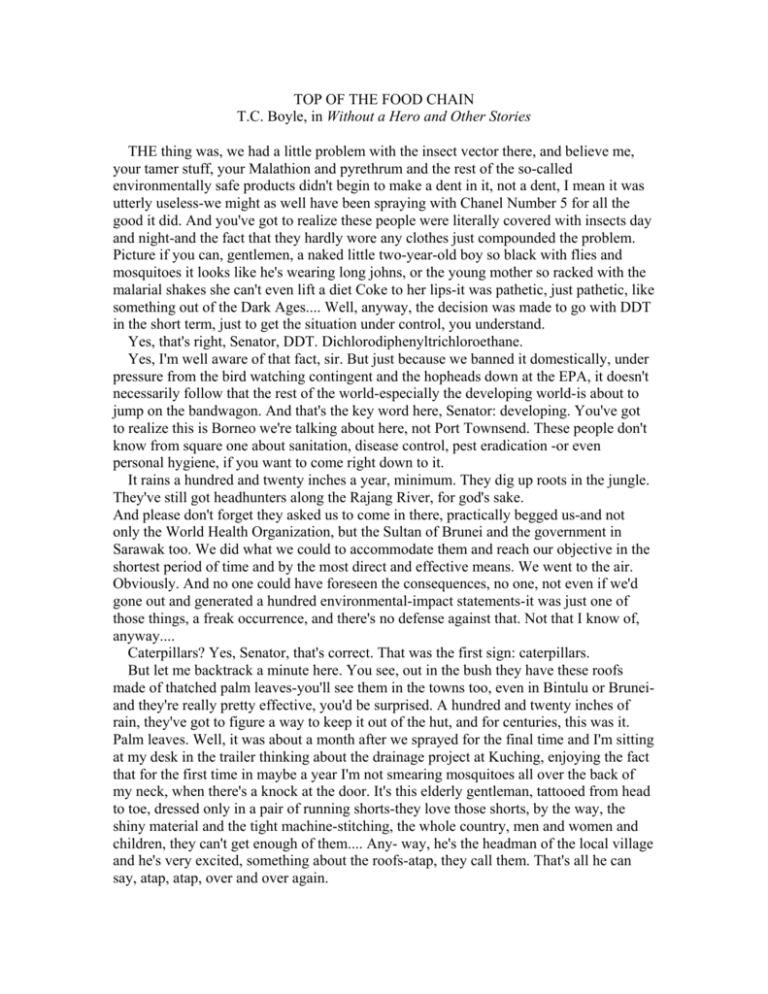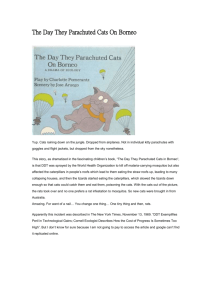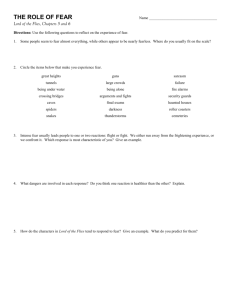Top of the Food Chain - H
advertisement

TOP OF THE FOOD CHAIN T.C. Boyle, in Without a Hero and Other Stories THE thing was, we had a little problem with the insect vector there, and believe me, your tamer stuff, your Malathion and pyrethrum and the rest of the so-called environmentally safe products didn't begin to make a dent in it, not a dent, I mean it was utterly useless-we might as well have been spraying with Chanel Number 5 for all the good it did. And you've got to realize these people were literally covered with insects day and night-and the fact that they hardly wore any clothes just compounded the problem. Picture if you can, gentlemen, a naked little two-year-old boy so black with flies and mosquitoes it looks like he's wearing long johns, or the young mother so racked with the malarial shakes she can't even lift a diet Coke to her lips-it was pathetic, just pathetic, like something out of the Dark Ages.... Well, anyway, the decision was made to go with DDT in the short term, just to get the situation under control, you understand. Yes, that's right, Senator, DDT. Dichlorodiphenyltrichloroethane. Yes, I'm well aware of that fact, sir. But just because we banned it domestically, under pressure from the bird watching contingent and the hopheads down at the EPA, it doesn't necessarily follow that the rest of the world-especially the developing world-is about to jump on the bandwagon. And that's the key word here, Senator: developing. You've got to realize this is Borneo we're talking about here, not Port Townsend. These people don't know from square one about sanitation, disease control, pest eradication -or even personal hygiene, if you want to come right down to it. It rains a hundred and twenty inches a year, minimum. They dig up roots in the jungle. They've still got headhunters along the Rajang River, for god's sake. And please don't forget they asked us to come in there, practically begged us-and not only the World Health Organization, but the Sultan of Brunei and the government in Sarawak too. We did what we could to accommodate them and reach our objective in the shortest period of time and by the most direct and effective means. We went to the air. Obviously. And no one could have foreseen the consequences, no one, not even if we'd gone out and generated a hundred environmental-impact statements-it was just one of those things, a freak occurrence, and there's no defense against that. Not that I know of, anyway.... Caterpillars? Yes, Senator, that's correct. That was the first sign: caterpillars. But let me backtrack a minute here. You see, out in the bush they have these roofs made of thatched palm leaves-you'll see them in the towns too, even in Bintulu or Bruneiand they're really pretty effective, you'd be surprised. A hundred and twenty inches of rain, they've got to figure a way to keep it out of the hut, and for centuries, this was it. Palm leaves. Well, it was about a month after we sprayed for the final time and I'm sitting at my desk in the trailer thinking about the drainage project at Kuching, enjoying the fact that for the first time in maybe a year I'm not smearing mosquitoes all over the back of my neck, when there's a knock at the door. It's this elderly gentleman, tattooed from head to toe, dressed only in a pair of running shorts-they love those shorts, by the way, the shiny material and the tight machine-stitching, the whole country, men and women and children, they can't get enough of them.... Any- way, he's the headman of the local village and he's very excited, something about the roofs-atap, they call them. That's all he can say, atap, atap, over and over again. It's raining, of course. It's always raining. So I shrug into my rain slicker, start up the 4X4 and go have a look. Sure enough, all the atap roofs are collapsing, not only in his village, but throughout the target area. The people are all huddled there in their running shorts, looking pretty miserable, and one after another the roofs keep falling in, it's bewildering, and gradually I realize the headman's diatribe has begun to feature a new term I was unfamiliar with at the time-the word for caterpillar, as it turns out, in the Than dialect. But who was to make the connection between three passes with the crop duster and all these staved-in roofs? Our people finally sorted it out a couple weeks later. The chemical, which, by the way, cut down the number of mosquitoes exponentially, had the unfortunate side effect of killing off this little wasp-I've got the scientific name for it somewhere in my report here, if you're interested-that preyed on a type of caterpillar that in turn ate palm leaves. Well, with the wasps gone, the caterpillars hatched out with nothing to keep them in check and chewed the roofs to pieces, and that was unfortunate, we admit it, and we had a real cost overrun on replacing those roofs with tin . . . but the people were happier, I think, in the long run, because let's face it, no matter how tightly you weave those palm leaves, they're just not going to keep the water out like tin. Of course, nothing's perfect, and we had a lot of complaints about the rain drumming on the panels, people unable to sleep and whathave-you.... Yes, sir, that's correct-the flies were next. Well, you've got to understand the magnitude of the fly problem in Borneo, there's nothing like it here to compare it with, except maybe a garbage strike in New York. Every minute of every day you've got flies everywhere, up your nose, in your mouth, your ears, your eyes, flies in your rice, your Coke, your Singapore sling and your gin rickey. It's enough to drive you to distraction, not to mention the diseases these things carry, from dysentery to typhoid to cholera and back round the loop again. And once the mosquito population was down, the flies seemed to breed up to fill in the gap-Borneo wouldn't be Borneo without some damned insect blackening the air. Of course, this was before our people had tracked down the problem with the caterpillars and the wasps and all of that, and so we figured we'd had a big success with the mosquitoes, why not a series of ground sweeps, mount a fogger in the back of a Suzuki Brat and sanitize the huts, not to mention the open sewers, which as you know are nothing but a breeding ground for flies, chiggers and biting insects of every sort. At least it was an error of commission rather than omission. At least we were trying. I watched the flies go down myself. One day they were so thick in the trailer I couldn't even find my paperwork, let alone attempt to get through it, and the next they were collecting on the windows, bumbling around like they were drunk. A day later they were gone. Just like that. From a million flies in the trailer to none.... Well, no one could have foreseen that, Senator. The geckos ate the flies, yes. You're all familiar with geckos, I assume, gentlemen? These are the lizards you've seen during your trips to Hawaii, very colorful, patrolling the houses for roaches and flies, almost like pets, but of course they're wild animals, never lose sight of that, and just about as unsanitary as anything I can think of, except maybe flies. Yes, well don't forget, sir, we're viewing this with twenty-twenty hindsight, but at the time no one gave a thought to geckos or what they ate-they were just another fact of life in the tropics. Mosquitoes, lizards, scorpions, leeches-you name it, they've got it. When the flies began piling up on the windowsills like drift, naturally the geckos feasted on them, stuffing themselves till they looked like sausages crawling up the walls. Where before they moved so fast you could never be sure you'd seen them, now they waddled across the floor, laid around in the corners, clung to the air vents like magnets-and even then no one paid much attention to them till they started turning belly-up in the streets. Believe me, we confirmed a lot of things there about the buildup of these products as you move up the food chain and the efficacy-or lack thereof-of certain methods, no doubt about that.... The cats? That's where it got sticky, really sticky. You see, nobody really lost any sleep over a pile of dead lizards-though we did the tests routinely and the tests confirmed what we'd expected, that is, the product had been concentrated in the geckos because of the sheer number of contaminated flies they consumed. But lizards are one thing and cats are another. These people really have an affection for their cats-no house, no hut, no matter how primitive, is without at least a couple of them. Mangy-looking things, long-legged and scrawny, maybe, not at all the sort of animal you'd see here, but there it was: they loved their cats. Because the cats were functional, you understand-without them, the place would have been swimming in rodents inside of a week. You're right there, Senator, yes-that's exactly what happened. You see, the cats had a field day with these feeble geckos-you can imagine, if any of you have ever owned a cat, the land of joy these animals must have experienced to see their nemesis, this ultra- quick lizard, and it's just barely creeping across the floor like a bug. Well, to make a long story short, the cats ate up every dead and dying geckos in the country, from snout to tail, and then the cats began to die ... which to my mind would have been no great loss if it wasn't for the rats. Suddenly there were rats everywhere-you couldn't drive down the street without running over half-a-dozen of them at a time. They fouled the grain supplies, fell in the wells and died, bit infants as they slept in their cradles. But that wasn't the worst, not by a long shot. No, things really went down the tube after that. Within the month we were getting scattered reports of bubonic plague, and of course we tracked them all down and made sure the people got a round of treatment with antibiotics, but still we lost a few and the rats kept coming.... It was my plan, yes. I was brainstorming one night, rats scuttling all over the trailer like something out of a cheap horror film, the villagers in a panic over the threat of the plague and the stream of nonstop hysterical reports from the interior-people were turning black, swelling up and bursting, that sort of thing-well, as I say, I came up with a plan, a stopgap, not perfect, not cheap; but at this juncture, I'm sure your agree, something had to be implemented. We wound up going as far as Australia for some of the cats, cleaning out the SPCA facilities and what-have-you, though we rounded most of them up in Indonesia and Singapore-approximately fourteen thousand in all. And yes, it cost us-cost us upfront purchase money and aircraft fuel and pilots' overtime and all the rest of itbut we really felt there was no alternative. It was like all nature had turned against us. And yet still, all things considered, we made a lot of friends for the U.S.A. the day we dropped those cats, and you should have seen them, gentlemen, the little parachutes and harnesses we'd tricked up, fourteen thousand of them, cats in every color of the rainbow, cats with one ear, no ears, half a tail, three-legged cats, cats that could have taken pride of show in Springfield, Massachusetts, and all of them twirling down out of the sky like great big oversized snowflakes.... It was something. It was really something. Of course, you've all seen the reports. There were other factors we hadn't counted on, adverse conditions in the paddies and manioc fields-we don't to this day know what predatory species were inadvertently killed off by the initial sprayings, it's just a mystery-but the weevils and whatnot took a pretty heavy toll on the crops that year, and by the time we dropped the cats, well, the people were pretty hungry, and I suppose it was inevitable that we lost a good proportion of them right then and there. But we've got a CARE program going there now, and something hit the rat population- we still don't know what, a virus, we think-and the geckos, they tell me, are making a comeback. So what I'm saying is, it could be worse, and to every cloud a silver lining, wouldn't you agree, gentlemen? Assignment: Make a food web of all the organisms affected by the spraying of DDT in Borneo.






